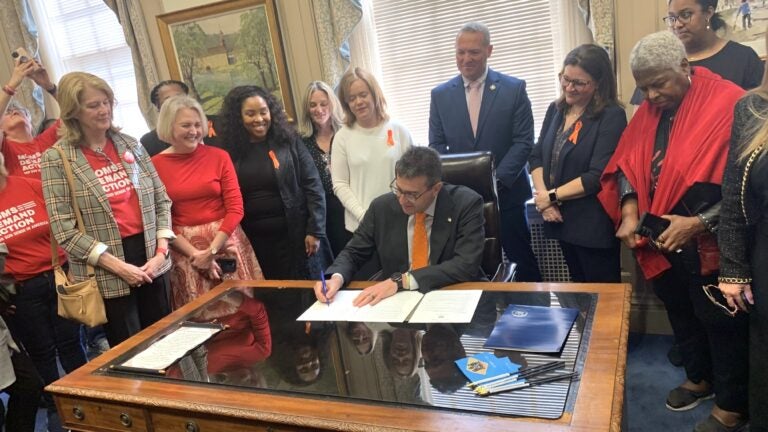Delaware Gov. Matt Meyer vetoes bill relaxing marijuana retail store restrictions, drawing outrage from fellow Democrats
Delaware Senate Democrats say the governor agreed to allow a pot zoning bill to become law. Gov. Meyer denies existence of a deal.

Delaware Gov. Matt Meyer signs executive order creating a statewide Office of Gun Violence Prevention and Community Safety surrounded by state lawmakers and gun control advocates.(Sarah Mueller/WHYY)
What are journalists missing from the state of Delaware? What would you most like WHYY News to cover? Let us know.
Delaware Gov. Matt Meyer left cannabis advocates and lawmakers frustrated by vetoing legislation that would have loosened local government regulations for where recreational marijuana stores could be located within the state’s three counties. The veto essentially leaves the counties’ more restrictive rules in place.
State Sen. Trey Paradee, D-Dover, sponsored the bill, which passed mostly along party lines. It would have allowed retail cannabis outlets in commercial- or industrial-zoned areas as long as they were not within a half-mile of another recreational cannabis store or within 500 feet of places such as schools, day cares, residential substance abuse treatment facilities and parks.
Meyer said he vetoed the legislation because he opposed taking local control away from counties and the limiting setback requirements for schools to 500 feet.
“If selling marijuana 501 feet from your local elementary school is such a big priority for people, then they can override the veto,” he said during a news conference Friday.
Meyer is also pushing for counties and municipalities to share in the revenue from the burgeoning recreational cannabis industry. He’s advocating they get 4.5% of the total marijuana tax money collected. Retail sales started Aug. 1.
Paradee ripped Meyer for vetoing the bill. He said in a statement that he had made a deal with the governor in late June where Meyer would allow it to become law without his signature.
“My father used to have an expression: ‘Son, if you ain’t got your word, you got nothing,’” Paradee said in a statement Thursday. “He meant if you give someone your word and you later back out or do not deliver as you promised, you will irreparably tarnish your name and reputation. Once that happens, no one will trust you or want to work with you again.”
Meyer disputed Paradee’s assertion that a deal had been struck, but would not directly answer whether Paradee’s claim was untrue. The governor also said he knew nothing about a deal over the legislation made by his Director of Policy John Kane and Paradee.
Jesse Chadderdon, chief of staff for the Senate Majority Caucus said there were many discussions between the governor’s office and Senate leadership.
“If the governor is saying that he had no idea about the deal, at worst he’s being dishonest,” Chadderon said. “Or he and his staff have such a disconnect that is causing massive functional problems between the administration and the General Assembly.”
Counties had vocally opposed Paradee’s bill, as did Republican lawmakers who were concerned over what they saw as a loss of local control. But weed entrepreneurs have complained there’s nowhere to set up shop because county ordinances like the one in Sussex County have boxed them out of every likely feasible location.
The county has restricted retail stores to the C3 zoning district reserved for heavy commercial uses. Sites must be located 3 miles away from any municipality, church, school or substance abuse treatment center.
However, some cannabis advocates said they’re pleased with Meyer’s decision to reject the bill. The governor included his own draft proposal for revamping zoning restrictions. It would ask Sussex County to consider reforms such as allowing recreational pot stores in more zones and reducing the setbacks for the facilities.
“We’re very happy with the governor’s proposed plan on zoning, which we believe will address both county and municipality issues,” said Zoe Patchell, who leads the nonprofit Delaware Cannabis Advocacy Network.
Delaware Cannabis Industry Association President James Brobyn said he doesn’t think the governor’s zoning proposal will solve Sussex County’s “total ban” on retail stores. He said he believes the veto was to leverage the tax revenue the recreational weed market is expected to rake in.
“It’s very frustrating to watch them play games in Dover,” he said. “And on the backs of small business owners and future small business owners. I’ve been living here since 2010 and all the big companies get massive tax write-offs and grants from the state, and we can’t do basic things like help small businesses get up and running.”
Delaware has authorized 30 recreational licenses for retail sales, which are still in the process of getting approved. Meanwhile, the 13 medical marijuana dispensaries are able to sell recreational marijuana through conversion licenses designed to kick off the regulated commercial market.
Despite Meyer’s insistence that his relationship with Senate Democrats is good, it has proved to be contentious at best since the start of his tenure in January. The governor and senators started the year with a fight with the chamber’s Democratic leadership over nominees to the Diamond State Port Corporation, the quasi-public entity that oversees the Port of Wilmington.
This story was supported by a statehouse coverage grant from the Corporation for Public Broadcasting.

Get daily updates from WHYY News!
WHYY is your source for fact-based, in-depth journalism and information. As a nonprofit organization, we rely on financial support from readers like you. Please give today.







